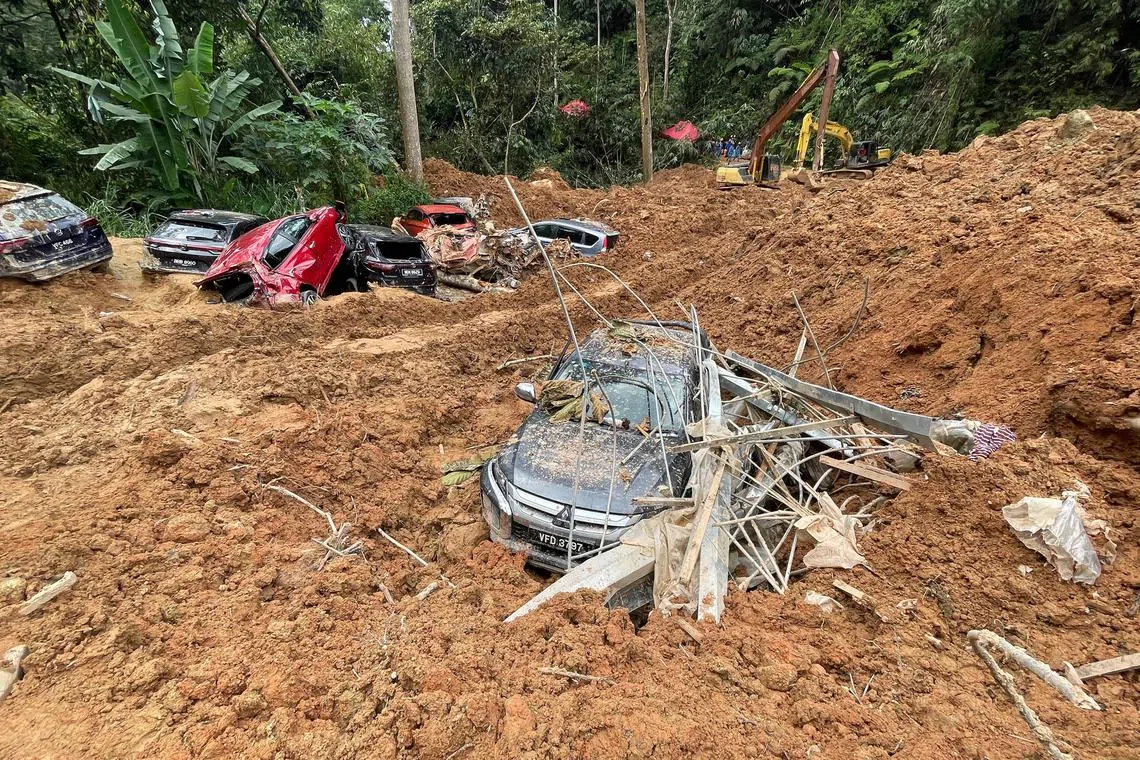2022 Batang Kali landslide was due to heavy rain: Malaysian DPM
Sign up now: Get insights on the biggest stories in Malaysia

The landslide occurred on Dec 16, 2022, at the Father’s Organic Farm campsite in Batang Kali, on the outskirts of the Malaysian capital Kuala Lumpur.
PHOTO: LIANHE ZAOBAO FILE
Follow topic:
PETALING JAYA – The deadly Batang Kali landslide
He said the investigation into the incident found that it was caused by major cumulative rainfall over a period of five days before the landslide occurred.
“In summary, the results of the forensic analysis found that the rainfall event was the main triggering factor as a result of the combination of the amount of major cumulative rainfall for a period of five days and the antecedent rainfall cumulative for 30 days before the collapse occurred, which was 118.6mm and 444.8mm, respectively,” Datuk Seri Zahid, who chaired the Central Disaster Management Committee, said in a statement.
“This heavy rain caused the slope failure, resulting in the camping site covering the Hill View, Farm View and River Side areas being buried in soil, causing damage to property and loss of life.
“The investigation did not find strong evidence showing anthropogenic activity as one of the contributing factors to this landslide event,”
The landslide occurred on Dec 16, 2022, at the Father’s Organic Farm campsite in Batang Kali, on the outskirts of the Malaysian capital Kuala Lumpur.
The incident took place during the wee hours and killed 31 people
Following the tragedy, a special committee called the Landslide Working Group Committee (JKKTR) was established.
Its aim was to carry out an investigation based on the National Slope Master Plan 2009-2023, according to a decision by Cabinet ministers, Dr Zahid said.
The committee was led by the Slope Engineering Branch of the Public Works Department and was joined by other technical agencies such as the Department of Minerals and Geosciences Malaysia, and the Department of Survey and Mapping Malaysia.
The Department of Irrigation and Drainage, Department of Meteorology Malaysia, Universiti Teknologi Malaysia and appointed professional bodies were also part of the committee.
Dr Zahid said the forensic report prepared by JKKTR has been forwarded to the Works Ministry and the Selangor government to be declassified so that the results of the probe can be accessed by the public.
“The Selangor government agreed to declassify the report on Oct 5, 2023. The report was submitted to the National Disaster Management Agency (Nadma) on Oct 12, 2023, for further action,” he said.
The full report can be accessed at Nadma’s website – – from Wednesday. THE STAR/ASIA NEWS NETWORK

